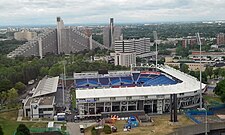Saputo Stadium
 |
|

Saputo Stadium in 2012
|
|
| Address | 4750 Sherbrooke Street E |
|---|---|
| Location | Montreal, Quebec |
| Coordinates | 45°33′47″N 73°33′9″W / 45.56306°N 73.55250°WCoordinates: 45°33′47″N 73°33′9″W / 45.56306°N 73.55250°W |
| Owner | Saputo Inc. |
| Operator | Montreal Impact |
| Capacity | 20,801 |
| Field size | 120 by 77 yards (110 m × 70 m) |
| Surface | Kentucky Bluegrass |
| Construction | |
| Broke ground | April 18, 2007 |
| Opened | May 18, 2008 |
| Expanded | June 16, 2012 |
| Construction cost | C$47 million |
| Architect | Zinno Zappitelli Architectes (2008); Provencher Roy + Associés Architectes (2012) |
| Services engineer | CIMA+ Engineering |
| General contractor | Broccolini Construction Inc. |
| Main contractors | Dant Clayton Corporation |
| Tenants | |
|
Montreal Impact (MLS) (2012–present) Montreal Impact (NASL) (2008–2011) Montreal Impact U23 (PDL) (2014) Montreal Impact Academy (CSL) (2010-2012) Canada men's national soccer team (2008–2010) FC Montreal (USL) (2015–2016) |
|
Saputo Stadium (French: Stade Saputo) is a soccer-specific stadium at Olympic Park in Montreal, Quebec, Canada. The stadium opened on May 21, 2008, and is the current home of the Montreal Impact. The stadium is built on the former practice track and field site on the grounds of the 1976 Summer Olympics, while the stadium's west side has a view of Olympic Stadium's inclined tower. It has a capacity of 20,801, making it the second-largest soccer-specific stadium in Canada, after BMO Field in Toronto.
The stadium cost CA$17 million ($18.9 million in 2016 dollars) to build, with $7.5 million paid by the Saputo family and the rest financed on a 25-year term. Saputo Stadium is now the Impact's administrative headquarters and also includes a training field, 34 corporate suites and full player welfare areas. The complex covers approximately 1,600,000 square feet (150,000 m2). It was designed and fabricated by Dant Clayton Corporation and built by Broccolini Construction Inc.
The stadium features a natural grass playing surface and was reportedly preferred over BMO Field for this reason by members of the Canada men's national soccer team. BMO Field has since installed a heated and fully irrigated natural grass field similar to those found in the English Premier League.
Anticipating a Montreal entry into Major League Soccer, plans were made to expand the stadium from its initial 13,034 capacity to 20,000 to cope with the anticipated boost in attendance. The Quebec government put $23 million for the renovation and expansion of the stadium (the total cost of the stadium was therefore about $40 million). The construction plans went into effect after MLS granted Montreal their nineteenth franchise, which began play in the 2012 season.
...
Wikipedia
